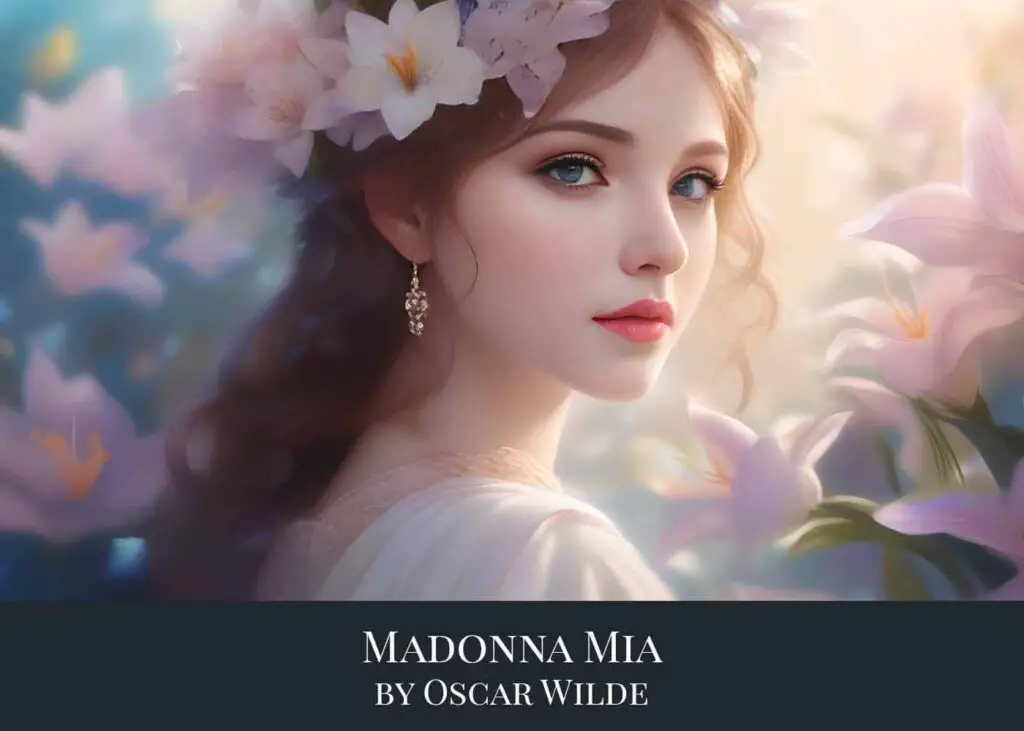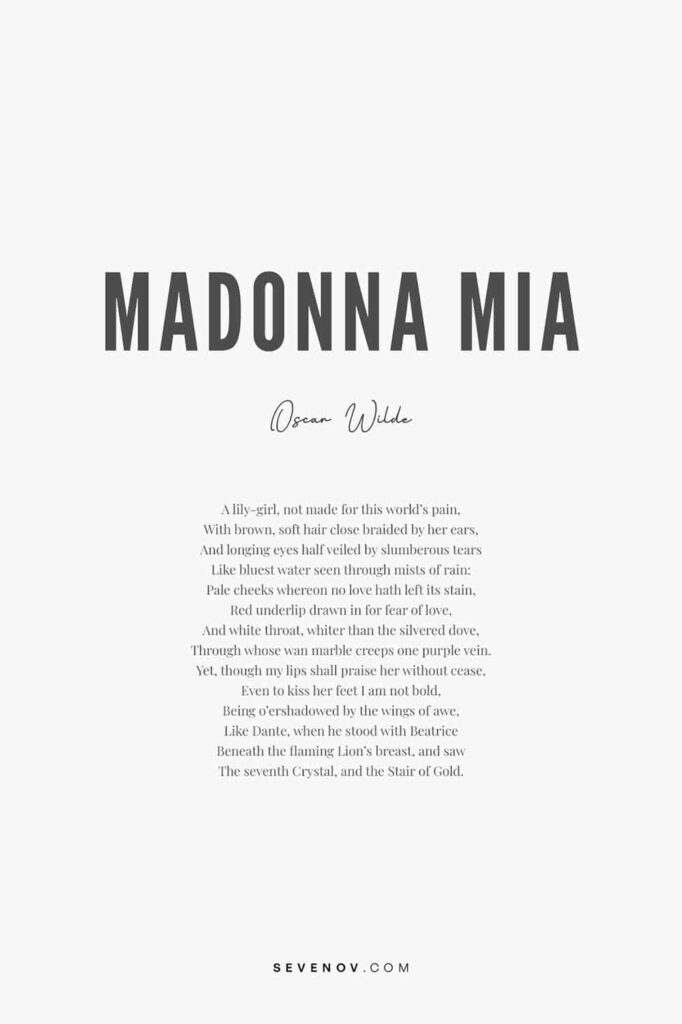
Madonna Mia by Oscar Wilde
“Madonna Mia” is one of the enchanting compositions by poet and dramatist Oscar Wilde, capturing the essence of ethereal beauty and the profound admiration Wilde often conveyed in his works. The poem resonates with Wilde’s signature blend of imagery and deep emotion. This poem, among many other masterpieces, is found in Wilde’s poetry collection Poems. Readers intrigued by this poetic piece can delve further into Wilde’s poetic genius by checking out the Poems online book on PageVio.
1. The Poem
A lily-girl, not made for this world’s pain,
With brown, soft hair close braided by her ears,
And longing eyes half veiled by slumberous tears
Like bluest water seen through mists of rain:
Pale cheeks whereon no love hath left its stain,
Red underlip drawn in for fear of love,
And white throat, whiter than the silvered dove,
Through whose wan marble creeps one purple vein.
Yet, though my lips shall praise her without cease,
Even to kiss her feet I am not bold,
Being o’ershadowed by the wings of awe,
Like Dante, when he stood with Beatrice
Beneath the flaming Lion’s breast, and saw
The seventh Crystal, and the Stair of Gold.

Size: 8″ x 12″ (2:3 ratio)
Format: PDF
Copyright information: For personal use only
Note: Actual poster background color is white. For the sample poster, the background is made gray for illustration purpose.
2. Madonna Mia Analysis
This poem paints a portrait of a delicate and ethereal girl, comparing her to a lily, a symbol of purity and fragility. The descriptions of her beauty and demeanor suggest she is untainted by the hardships and passions of the world, thus emphasizing her otherworldly nature. Let’s break it down stanza by stanza:
A lily-girl, not made for this world’s pain,
The girl is compared to a lily, suggesting purity, delicacy, and beauty. The statement that she’s “not made for this world’s pain” implies she seems too gentle or pure to endure the hardships of life.
With brown, soft hair close braided by her ears,
And longing eyes half veiled by slumberous tears
Like bluest water seen through mists of rain:
Her physical features are described: brown hair, longing eyes that appear dreamy or tearful. Her eyes are likened to “bluest water seen through mists of rain,” suggesting a depth of emotion or perhaps sadness.
Pale cheeks whereon no love hath left its stain,
Red underlip drawn in for fear of love,
And white throat, whiter than the silvered dove,
Through whose wan marble creeps one purple vein.
Her pale cheeks suggest innocence, and the fact that “no love hath left its stain” means she has not been touched or tainted by romantic love. The “red underlip drawn in for fear of love” portrays her as being timid or shy about romantic interactions. The description of her throat further emphasizes her purity and delicacy, with the one purple vein standing out against her pale skin.
Yet, though my lips shall praise her without cease,
Even to kiss her feet I am not bold,
The speaker adores her, constantly praising her, yet feels unworthy or too intimidated even to kiss her feet. This portrays the girl as almost divine or on a pedestal, out of the speaker’s reach.
Being o’ershadowed by the wings of awe,
Like Dante, when he stood with Beatrice
Beneath the flaming Lion’s breast, and saw
The seventh Crystal, and the Stair of Gold.
The speaker feels overwhelmed (“o’ershadowed by the wings of awe”). The comparison to Dante and Beatrice alludes to Dante Alighieri’s “Divine Comedy,” in which Dante is led by his muse, Beatrice, through the heavenly realms. The “flaming Lion’s breast,” “seventh Crystal,” and “Stair of Gold” refer to the wondrous, otherworldly sights of the celestial paradise. This comparison elevates the girl’s beauty and grace to something divine and otherworldly.
In conclusion, the poem paints a picture of a girl of immense beauty and purity, who evokes feelings of admiration and awe in the speaker. Through vivid imagery and allusion, Wilde presents her as an almost divine being, eliciting deep respect and reverence from the speaker.
3. Conclusion
Should “Madonna Mia” leave you enchanted, delve into further poetic works by Oscar Wilde.




